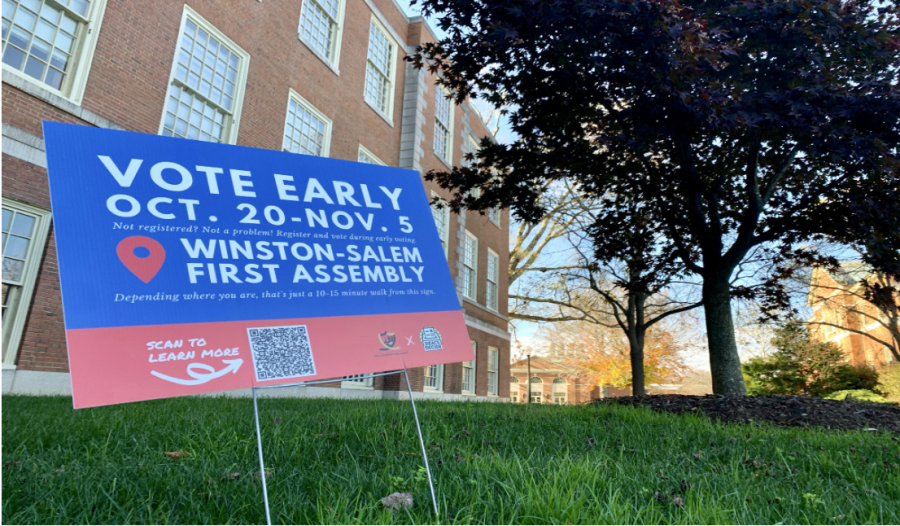Data from a Wake Forest wellness survey suggest that the university’s hard-working culture leads students to ignore symptoms of mental illness.
The survey, conducted last April, asked 350 students a series of questions relating to happiness and satisfaction, as well as anxiety, depression and loneliness.
Of the responses, over 75 percent students reported an inability to stop or control worrying in the past two weeks. In contrast, 65 percent of students expressed satisfaction with their emotional health.
“[This information] speaks to the normalization of mental health symptoms on campus,” said Spencer Schiller, student government president. “It also shows that people may not understand their mental health.”
In high stress environments, this behavior can prove to be obstructive, and in some cases, dangerous to a healthy lifestyle.
For many students, this begins with a lack of balance in lifestyle decisions that takes place outside of the classroom. Wake Forest’s always-busy culture often leads students into over-involvement in a series of clubs and organizations.
According to Suzanne Hunt, assistant director of Wellbeing and Health Promotion at the WFU Thrive Office, this can have a negative effect on personal wellness.
“Students are so busy because they’re overinvolved,” Hunt said. “They’re not seeing the signs of stress — the things that are affecting their emotional wellbeing — until it’s too late.”
Identifying Hazards
This impression of students’ tunnel vision is reinforced by data. Nearly 85 percent of respondents reported that they worry too much about different things. And yet, 71 percent responded that they feel satisfied with their ability to balance school life with other aspects of their lives.
A lack of awareness of mental health issues among students could be a part of explaining what seems to be contradictory responses in the survey — normalizing symptoms of stress and anxiety interferes with students’ understanding of what healthy living should look like.
“The first conversation we should be having is making sure that students understand their mental health,” Schiller said.
Bringing attention to the issue of personal wellness is not a new effort for Schiller. In 2016, he and senior Parth Vaidya helped establish Wake Forest’s mental health week, which is held every spring. Each day during the week holds a different opportunity to engage students and talk about mental wellness.
Still, survey responses suggest that students are experiencing mental and emotional hurdles, while simultaneously assuming that some extreme symptoms are routine and normal. While alarming, the dilemma isn’t isolated just to Wake Forest.
“The issues that are happening at Wake Forest are happening nationally, and that’s anxiety, stress and depression,” Hunt said. “I think that happens because we don’t really put the brakes on at any point, until it’s too late.”
Opening Eyes
In many respects, Wake Forest actually reported lower rates of these issues. When compared to aggregate responses to the same questions, students at Wake Forest appear to be less frequently depressed and worried than students at other colleges and universities.
That being said, many of these responses still reflect a challenge for students to tackle. Despite reporting a lower rate than other universities, 50.4 percent of Wake Forest respondents in the wellness survey reported experiencing feelings of depression within two weeks prior to the survey. Even more alarming is that 4.6 percent of respondents reported feeling depressed every day.
To Schiller, these students are a priority. “We have to address the students who are at largest risk first,” he said.
One category of responses that raised alarm among students were questions relating to loneliness and isolation. Forty percent of students reported that they felt as though they didn’t have friends within two weeks of taking the survey. Even more reported that they felt isolated from others.
“That surprises me,” said Kaitlyn Garry, a freshman. “I feel like people are constantly around me — I never have any alone time, really.”
Loneliness may be harder to spot at Wake Forest because of this very reason. On such a small campus, many students are used to seeing friends and colleagues around almost daily.
However, the gap between people’s impression of their friends and their feelings of isolation seems to indicate that those students don’t feel close connections to the friends that they do have.
Taking Action
From the perspective of the student government president, Schiller says some aspects of Wake Forest’s social climate may be to blame.
“The university doesn’t address anything from Friday at 5 p.m. to Monday at 8 a.m. unless it’s a bad thing,” Schiller said.
Apart from events like Awake All Night and the Student Concert, which are well attended, but infrequent, there are very few opportunities for university sponsored social engagement.
This two-day gap is an opportunity to address some of the dilemmas illuminated by the wellness survey. Schiller says he hopes to create more opportunities for students to come together on weekends.
One program he hopes to push forward is a shuttle system that would take students to and from nearby Charlotte or Asheville for a day on weekends. The hope is that these sorts of opportunities would bring students together to make new connections and provide more options for students on weekends.
In an effort to raise awareness of mental health issues, Student Government also hopes to launch a series of smaller events on campus in order to reach out and talk to students about health and wellness.
As the survey data seem to suggest, Wake Forest’s relationship with stress and anxiety hinges upon starting a conversation on recognizing and managing symptoms.
“Talking to students, and showing them [this information] is the first step,” Schiller said.



















